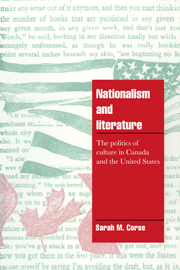Book contents
- Frontmatter
- Contents
- List of tables
- Acknowledgments
- 1 Introduction: cultural fields and literary use
- 2 Nation-building and the historical timing of a national literature in the United States
- 3 Nation-building and the historical timing of a national literature in Canada
- 4 The canonical novels: the politics of cultural nationalism
- 5 The literary prize winners: revision and renewal
- 6 The bestsellers: the economics of publishing and the convergence of popular taste
- 7 Literary meaning and cultural use
- Appendix A The canonical novels
- Appendix B The literary prize winners (1978–1987)
- Appendix C The bestsellers (1978–1987)
- Appendix D Coding sheet
- Appendix E Generic categories
- References
- Index
2 - Nation-building and the historical timing of a national literature in the United States
Published online by Cambridge University Press: 11 May 2010
- Frontmatter
- Contents
- List of tables
- Acknowledgments
- 1 Introduction: cultural fields and literary use
- 2 Nation-building and the historical timing of a national literature in the United States
- 3 Nation-building and the historical timing of a national literature in Canada
- 4 The canonical novels: the politics of cultural nationalism
- 5 The literary prize winners: revision and renewal
- 6 The bestsellers: the economics of publishing and the convergence of popular taste
- 7 Literary meaning and cultural use
- Appendix A The canonical novels
- Appendix B The literary prize winners (1978–1987)
- Appendix C The bestsellers (1978–1987)
- Appendix D Coding sheet
- Appendix E Generic categories
- References
- Index
Summary
Can we never be thought to have learning or grace
Unless it be brought from that horrible place
Where tyranny reigns with her impudent face;
And popes and pretenders,
And sly faith-defenders
Have ever been hostile to reason and wit,
Enslaving a world that shall conquer them yet.
“Literary Importation,” Philip Freneau's lamentation on British cultural domination of the newly formed United States, 1788.Freneau's poetic anguish over British cultural domination of the newly formed United States characterizes the historical self-consciousness of the nation-building process – and the clear sense that writers felt they had a role to play in the process. As I argued in chapter 1, newer work in nationalism has demonstrated the position of the nation as an “invented” or “imagined” construct supported by cultural stratagems that create and bolster the myths, traditions, and emotional ties that help constitute the nation in the mind of its citizens. Less work has been done, however, in specifying the role of high-culture literature and canon formation in that process. Chapters 2 and 3 rectify this omission through an analysis of the often quite deliberate construction and maintenance of national literatures in the United States and Canada respectively.
It is my argument that the emergence of a national literature in both Canada and the United States was concomitant with the initial period of nation-building. The identification and development of American and Canadian national literatures were used to help imagine the nation and to help develop a unique national identity.
- Type
- Chapter
- Information
- Nationalism and LiteratureThe Politics of Culture in Canada and the United States, pp. 18 - 33Publisher: Cambridge University PressPrint publication year: 1996

